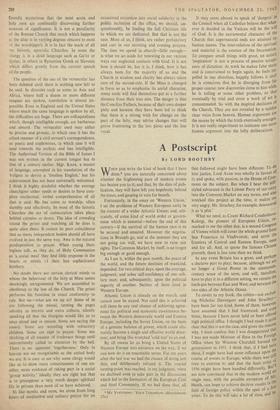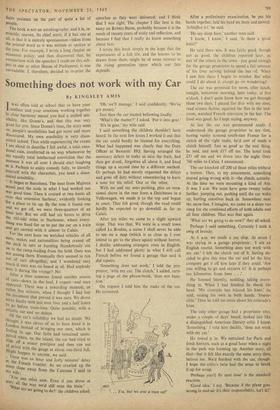A Postscript
By LORD BOOTHBY
WHEN you write the kind of book that I have done,* you are naturally concerned about whether the frightening pace of modern events has beaten you to it; and that, by the date of pub- lication, they will have left you hopelessly behind the times, and gasping in vain for breath.
Fortunately, in the essay on `Western Union,' I set the problems of Western European unity in the context of a wider Atlantic Union; and, ulti- mately, of some kind of world order or govern- ment which is essential—before the end of this century—if the survival of the human race is to be secured and ensured. However the negotia- tions in Brussels go, and at the moment they are not going too well, we have now to raise our sights. The Common Market, by itself, is no longer big enough or good enough.
As I see it, within the past month, the peace of the world, and the future destinies of mankind, depended, for two critical days, upon the courage, judgment, and sober self-confidence of one soli- tary man; and, subsequently, upon the political sagacity of another. Neither of them lived in Western Europe.
Atlantic Union is already on the march, and cannot now be stayed. Not until this is achieved will there be any real chance of achieving agree- ment for political and economic co-existence be- tween the Western democratic world and Eastern Europe, including the Soviet Union, on the basis of a genuine balance of power, which could ulti- mately become a single and effective world deter- rent; and bring this wretched `cold war' to an end.
By all means let us bring a United States of Western Europe into existence on the way, if we can now do it on reasonable terms. For ten years after the last war we had the chance of doing just this; and deliberately refused it. The crucial turning-point was reached, in my judgment, when we declined even to take part in the discussions which led to the formation of the European Coal and Steel Community. If we had done that, all
* MY YESTERDAY: YOUR TOMORROW. (Hutchinson, 25s.) that followed might have been different. To do him justice, Lord Avon was wholly in favour of it; and spoke, with passion, in the House of Corn' mons on the subject. But when I hear the self- styled advocates in the Labour Party of our elan' into the Common Market on any terms, and who wrecked this project at the time, it makes nie very angry. Mr. Strachey, for example, denounced it as `a plot.'
What we need, as Count Richard Coudenhos'e" Kalergi, the pioneer of European Union, re- marked to me the other day, is a second Congress of Vienna which will cover the whole ground from San Francisco to Vladivostok; and settle the frontiers of Central and Eastern Europe, once and for all. And, to quote the famous Chinese proverb, there is less time than we think. In any event Britain has a great, and perhaps a decisive part to play; because, although we are no longer a Great Power in the nineteenth- century sense of the term, and will, iherefore, have to play it in a different setting, we remain the linch-pin between East and West, and between the two sides of the Atlantic Ocean. To revert to my book, the critics—not exclud- ing Nicholas Davenport and John Strachey' have been far too kind. Some of them, however' have assumed that I feel frustrated, and evert, bitter, because I have never held or been offered high political office. 1 thought I had made it quite clear that this is not the case, and given the reasons why. I must confess that I was disappointed that I was not made Minister of State in the Foreign Office when Sir Winston Churchill formed his government in 1951. I think that, if I had been there, I might have had some influence upon course of events in Europe, while there was stil time to exercise it; and that the Suez crisis Of E 1956 might have been handled differently. But I am now convinced that in the modern world no single man, with the possible exception of Is4r. Heath, can hope to achieve decisive results in the field of foreign policy within the span of a fel' years. To do this will take a lot of time, and ill'
finite patience on the part of quite a lot of People.
The book is not an autobiography; and it is, in- evitably, uneven. Its chief merit, if it has one at all, is that it is entirely spontaneous—taken from the printed word as it was written or spoken at the time. For example, I wrote a long chapter on economic policy; and then discovered that, by e. omparison with the speeches I made on this sub- ject in one or other House of Parliament, it was unreadable. I, therefore, decided to re-print the
speeches as they were delivered; and I think that I was right. The chapter I like best is the essay on Robert Burns, probably because it is the result of twenty years of study and reflection, and because I feel that I really do know something about him.
I wrote this book simply in the hope that the experiences of a full life, and the lessons to be drawn from them, might be of some interest to the rising generation upon which our fate depends.











































































 Previous page
Previous page